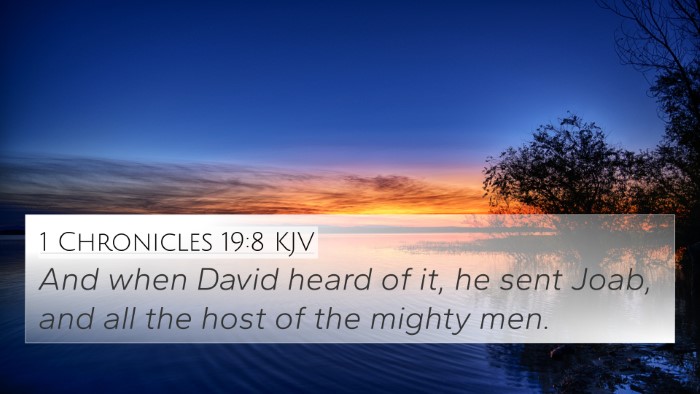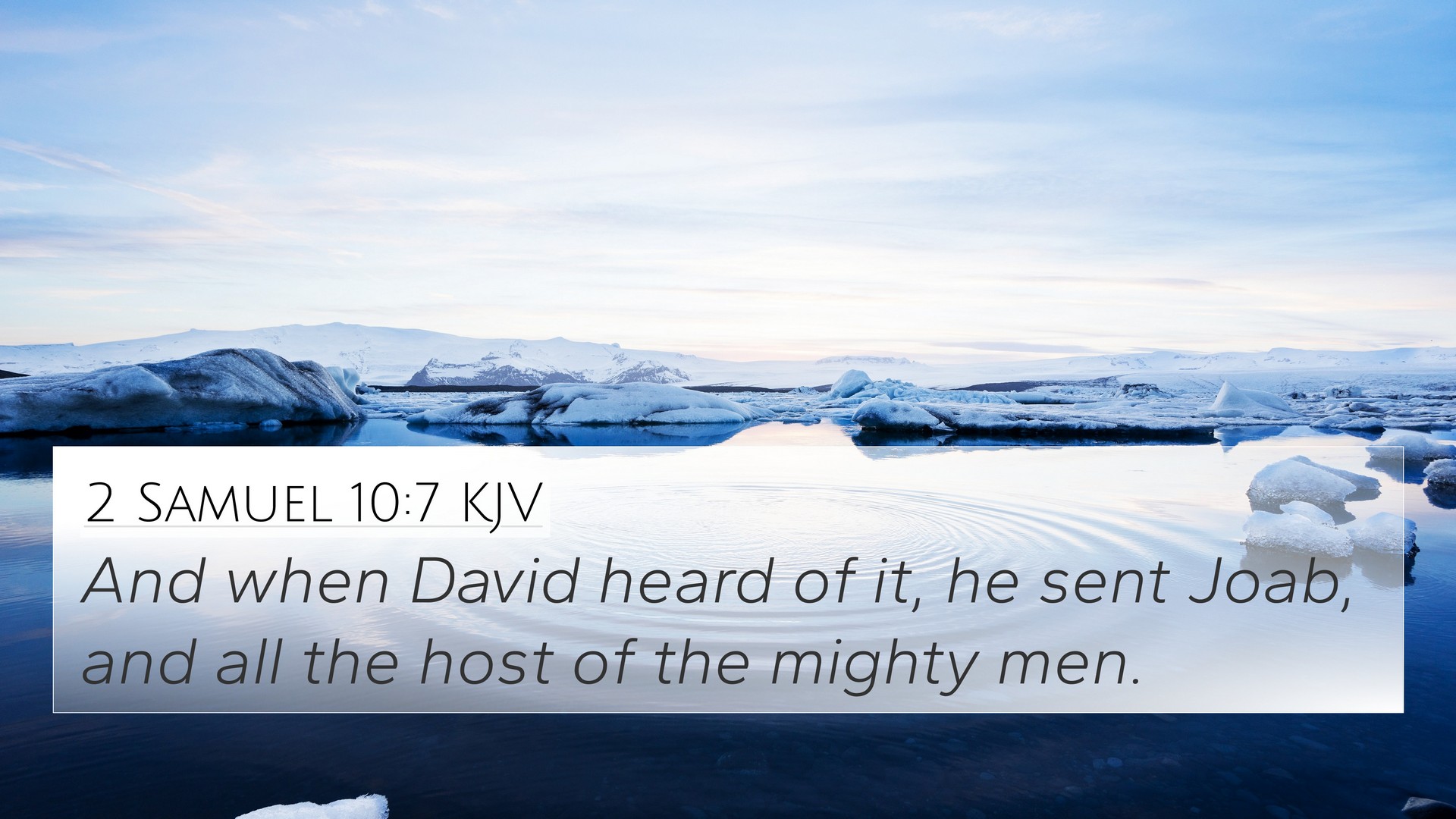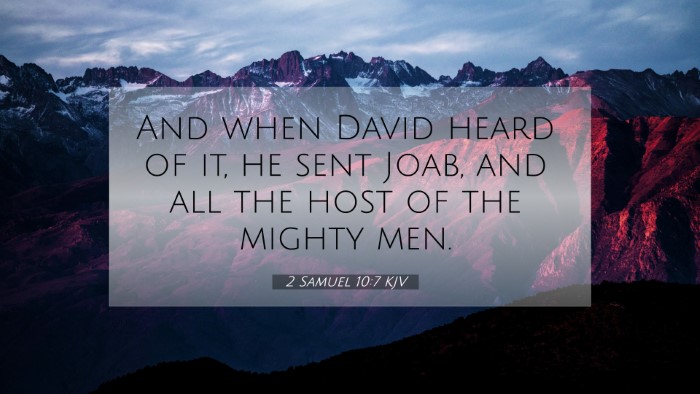Old Testament
Genesis Exodus Leviticus Numbers Deuteronomy Joshua Judges Ruth 1 Samuel 2 Samuel 1 Kings 2 Kings 1 Chronicles 2 Chronicles Ezra Nehemiah Esther Job Psalms Proverbs Ecclesiastes Song of Solomon Isaiah Jeremiah Lamentations Ezekiel Daniel Hosea Joel Amos Obadiah Jonah Micah Nahum Habakkuk Zephaniah Haggai Zechariah Malachi2 Samuel 10:7 Similar Verses
2 Samuel 10:7 Cross References
And when David heard of it, he sent Joab, and all the host of the mighty men.
Uncover the Rich Themes and Topics of This Bible Verse
Listed below are the Bible themes associated with 2 Samuel 10:7. We invite you to explore each theme to gain deeper insights into the Scriptures.
2 Samuel 10:7 Cross Reference Verses
This section features a detailed cross-reference designed to enrich your understanding of the Scriptures. Below, you will find carefully selected verses that echo the themes and teachings related to 2 Samuel 10:7 KJV. Click on any image to explore detailed analyses of related Bible verses and uncover deeper theological insights.

2 Samuel 23:8 (KJV) »
These be the names of the mighty men whom David had: The Tachmonite that sat in the seat, chief among the captains; the same was Adino the Eznite: he lift up his spear against eight hundred, whom he slew at one time.

1 Chronicles 19:8 (KJV) »
And when David heard of it, he sent Joab, and all the host of the mighty men.
2 Samuel 10:7 Verse Analysis and Similar Verses
Understanding 2 Samuel 10:7
Bible Verse: "When David heard of it, he sent Joab, and all the host of the mighty men." - 2 Samuel 10:7
Verse Summary
The verse precedes David's strategic response to the ammunitional challenges he faced after the death of Hanun, king of the Ammonites, who had mocked David's envoys. The significance of sending Joab and the mighty men illustrates David's reliance on experienced military leadership, his commitment to his kingdom, and his readiness to confront adversaries.
Meaning and Interpretation
Commentators provide a range of insights into the implications of this verse:
- Matthew Henry: He emphasizes the importance of David's proactive leadership and the decisive actions taken in times of adversity. Henry highlights the role of Joab as a skilled commander whose loyalty to David was steadfast, showcasing the importance of strong leaders in tumultuous times.
- Albert Barnes: Barnes notes the military preparations that David undertakes, framing it as a response to humiliation and aggression from the Ammonites. He interprets this action as a demonstration of David’s strategic prowess, where he mobilizes his best forces to respond to the challenge of the Ammonites, indicating a righteous and assertive approach in leadership.
- Adam Clarke: Clarke reflects on the political dynamics at play, including the bullying tactics of the Ammonites. He suggests that David's response was justifiable and necessary to uphold both his reputation and the integrity of his kingdom.
Connections Between Bible Verses
This verse has several thematic connections with other scriptures, showcasing principles of leadership, strategic warfare, and the significance of retaliation in the Biblical narrative. Here are some relevant cross-references:
- 1 Samuel 30:3-4: David’s earlier experiences with loss and the need for decisive action resonate with this later instance of war preparations.
- Psalm 20:7: Reflects on David’s faith in military might and divine support, aligning with his actions described in 2 Samuel 10.
- Proverbs 21:31: "The horse is prepared for the day of battle, but victory belongs to the Lord" can be traced as an underlying principle of David’s military strategies.
- 2 Samuel 8:1-14: This recounts David's series of victories that follows a similar pattern of response to challenges that threaten his kingdom.
- 1 Chronicles 19:1-5: Provides additional context about the actions taken by David and Joab, showcasing similar themes of warfare and diplomacy.
- Joshua 10:25: The principle of leadership during conflict echoes the resoluteness exhibited in David’s approach.
- 2 Samuel 1:17-27: David’s poetry in mourning emphasizes the emotional and political consequences of leadership decisions explored throughout 2 Samuel.
- 1 Chronicles 11:11-14: Speaks of Joab’s might and accomplishments, showcasing the attributes that made him a valuable aspect of David's military force.
- Ecclesiastes 3:8: "A time for war and a time for peace" encapsulates the thematic essence behind David’s military incursions.
- Romans 12:19: Highlights the divine justice that might support the rationale for David's actions, reminding us of the implications of righteous indignation.
Thematic Bible Verse Connections
Viewing this verse through various lenses of leadership, conflict, and divine authority allows for greater understanding of the overarching Biblical narrative. This invites further exploration into:
- Leadership Dynamics: The behavior of leaders in response to affronts is a recurring theme across the Bible.
- Conflict Resolution: How divine guidance influences human decisions during warfare.
- Justice and Retribution: The ethical considerations behind warfare, exploration of rightful vengeance in Biblical contexts.
Conclusion
2 Samuel 10:7 serves as a pivotal moment that encapsulates the complexities of David’s leadership during times of conflict. His strategic decision to send Joab and his mighty men bespeaks a narrative interwoven with themes of honor, warfare, and leadership integrity. The connections to other scriptures invite deeper reflections on the nature of God’s guidance in human affairs and the consequences of leadership decisions.
Cross-Referencing Bible Study
For those interested in tools for Bible cross-referencing, consider utilizing:
- Bible Concordance: A comprehensive resource for locating similar themes and passages.
- Bible Cross-Reference Guide: guides to streamline the study of interrelated scriptures.
- Cross-Reference Bible Study: A method to deepen understanding through thematic links.
- Bible Chain References: Helps track the thread of thought through various books.


